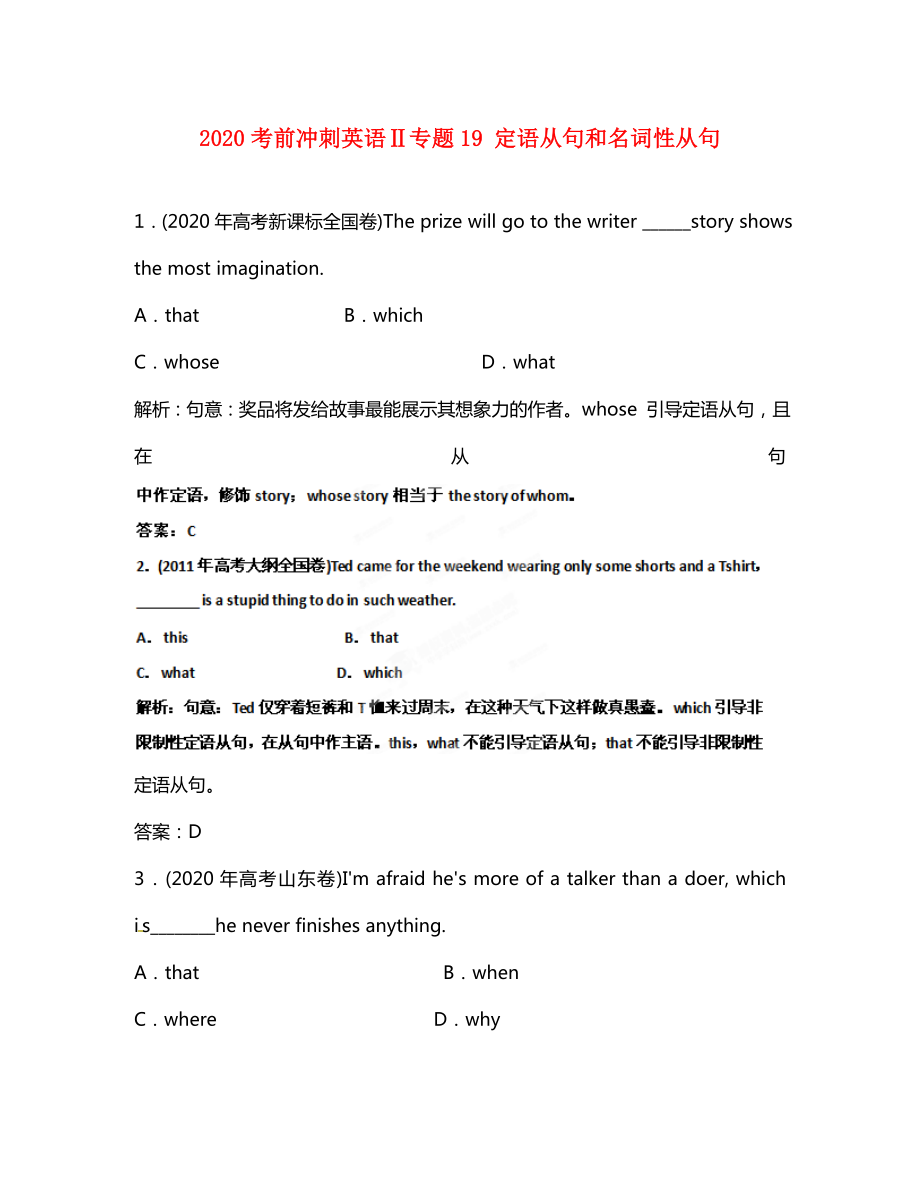《2020高考英語(yǔ)考前沖刺Ⅱ?qū)n}19 定語(yǔ)從句和名詞性從句》由會(huì)員分享���,可在線閱讀�����,更多相關(guān)《2020高考英語(yǔ)考前沖刺Ⅱ?qū)n}19 定語(yǔ)從句和名詞性從句(10頁(yè)珍藏版)》請(qǐng)?jiān)谘b配圖網(wǎng)上搜索��。
1���、2020考前沖刺英語(yǔ)Ⅱ?qū)n}19 定語(yǔ)從句和名詞性從句
1.(2020年高考新課標(biāo)全國(guó)卷)The prize will go to the writer ______story shows the most imagination.
A.that B.which
C.whose D.what
解析:句意:獎(jiǎng)品將發(fā)給故事最能展示其想象力的作者。whose 引導(dǎo)定語(yǔ)從句,且在從句定語(yǔ)從句����。
答案:D
3.(2020年高考山東卷)I'm afraid he's more of a talker than a doer,
2、 which is________he never finishes anything.
A.that B.when
C.where D.why
4.(2020年高考天津卷)Modern science has given clear evidence ________smoking can lead to many diseases.
A.what B.which
C.that D.wher
3�、e
解析:句意:現(xiàn)代科學(xué)對(duì)于吸煙能導(dǎo)致多種疾病已經(jīng)給出了明確的證據(jù)����。這是一個(gè)主從復(fù)合句,evidence后的從句是 evidence 的同位語(yǔ)���,對(duì) evidence 起解釋說(shuō)明的作用��,且該從句語(yǔ)意完整�����,故用 that 引導(dǎo)同位語(yǔ)從句�����。而 what�����,which����,where 均在從句中充當(dāng)一定的句子成分。
答案:C
5.(2020年高考江西卷)The villagers have already known ________ we'll do is to rebuild the bridge.
A.this B.that
C.what
4�、 D.which
行詞被序數(shù)詞、形容詞的最高級(jí)和all��,any�,few,little���,no�,the only�,the very,the last等詞修飾時(shí)���,定語(yǔ)從句的關(guān)系代詞要用that���;如果定語(yǔ)從句修飾兩個(gè)先行詞�,其中一個(gè)指人�����,一個(gè)指物�,那么定語(yǔ)從句的關(guān)系代詞也應(yīng)用that����。
2.通常只用which的情況
當(dāng)引導(dǎo)非限制性定語(yǔ)從句,指物或指代前面整個(gè)句子的內(nèi)容�����,或放在介詞后面指物時(shí)�����,只能用which。
[典例1] I refuse to accept the blame for something ________was someone els
5�����、e's fault.
A.who B.that
C.a(chǎn)s D.what
[解析] something作先行詞��,引導(dǎo)詞必須用that�����,并且此處that在從句中作主語(yǔ)��,不能省略�����。
[答案] B
[典例2] After graduating from college����,I took some time off to go travelling,________turned out to be a wise decision.
A.that
6��、 B.which
C.when D.where
which”或“of+which+the+名詞”��;表示人時(shí)相當(dāng)于“the+名詞+of+whom”或“of+whom+the+名詞”���。
[典例3] I've become good friends with several of the students in my school ________I met in the English speech contest last year.
A.who B.where
C
7�、.when D.which
[解析] ________I met in the English speech contest last year是定語(yǔ)從句修飾several of the students�����,who在定語(yǔ)從句中作賓語(yǔ)���。
[答案] A
3.where�,when�����,why引導(dǎo)的定語(yǔ)從句
where����,when,why的意義相當(dāng)于“介詞+which”。具體而言���,where相當(dāng)于“in/at+which”,when相當(dāng)于“at/in/during+which”�,why相當(dāng)于“for+which”。
(1)關(guān)系副詞where引導(dǎo)定語(yǔ)從句時(shí),只
8、能在定語(yǔ)從句中作地點(diǎn)狀語(yǔ)��,定語(yǔ)從句修飾的先行詞必須是表示地點(diǎn)的名詞。
(2)關(guān)系副詞when引導(dǎo)定語(yǔ)從句時(shí)�����,只能在定語(yǔ)從句中作時(shí)間狀語(yǔ),定語(yǔ)從句修飾的先行詞必須是表示時(shí)間的名詞����。
(3)關(guān)系副詞why引導(dǎo)定語(yǔ)從句時(shí),只能在定語(yǔ)從句中作原因狀語(yǔ)����,定語(yǔ)從句修飾的先行詞必須是表示原因的名詞��。
[典例4] The girl arranged to have piano lessons at the training centre with her sister________she would stay for an hour.
A.where B.who
9、
C.which D.what
[解析] where引導(dǎo)的定語(yǔ)從句修飾限定先行詞the training centre。
[答案] A
[典例5] (2020年高考浙江卷)A bank is the place ________ they lend you an umbrella in fair weather and ask for it back when it begins to rain.
A.when B.that
C.where D.there
語(yǔ)�����。the wa
10��、y作先行詞,其后定語(yǔ)從句的引導(dǎo)詞作狀語(yǔ)可用in which�����,that�����,或者省略引導(dǎo)詞�����。
[答案] A
[名詞性從句]
根據(jù)在句中的功能名詞性從句可分為主語(yǔ)從句�����、賓語(yǔ)從句、表語(yǔ)從句和同位語(yǔ)從句���。因?yàn)樗菑木?��,因此具有句子的特點(diǎn)�,有主、謂成分��,同時(shí)又具有名詞性特點(diǎn)���,這些從句和名詞一樣����,在句中可以充當(dāng)主語(yǔ)���、賓語(yǔ)(包括介詞賓語(yǔ)和動(dòng)詞賓語(yǔ)以及某些形容詞后的賓語(yǔ))�����、表語(yǔ)和同位語(yǔ)���。
一�、主語(yǔ)從句
1.分清引導(dǎo)主語(yǔ)從句的三類引導(dǎo)詞:(1)that不充當(dāng)句子成分,本身無(wú)意義����,僅起連接作用���,但不能省略��,通常用it作形式主語(yǔ)�����。(2)who,whom��,what���,which�,whoever,whatever�����,
11���、whichever本身有意義,在句中作主語(yǔ)或賓語(yǔ)��,不能省略���。(3)where����,when���,how����,why本it作形式主語(yǔ)��。
[典例1] ________some people regard as a drawback is seen as a plus by many others.
A.Whether B.What
C.That D.How
[解析] 該句的主語(yǔ)部分為_(kāi)_______some people regard as a drawback���;在該主語(yǔ)從句中regard后面缺少賓語(yǔ)���,所以要用what�����,此處what既引
12���、導(dǎo)主語(yǔ)從句又在主語(yǔ)從句中充當(dāng)賓語(yǔ)�����。that在句詞性從句中不充當(dāng)句子成分,本身無(wú)意義����,僅起連接作用,故用在此處不正確�����。
[答案] B
二、賓語(yǔ)從句
賓語(yǔ)從句在復(fù)合句中可以作動(dòng)詞的賓語(yǔ),也可以作介詞����、某些形容詞的賓語(yǔ)。
[典例2] (2020年高考上海卷)The message you intend to convey through words may be the exact opposite of ________others actually understand.
A.why B.that
C.which
13�����、 D.what
[解析] 句意:你想通過(guò)話語(yǔ)傳達(dá)的信息也許正與其他人實(shí)際理解的完全相反����。介詞of后的賓語(yǔ)從句中understand缺少賓語(yǔ)�,故用what,D為正確答案�。
[答案] D
三�、表語(yǔ)從句
1.that和whether引導(dǎo)的表語(yǔ)從句
that引導(dǎo)表語(yǔ)從句時(shí)��,that本身沒(méi)有詞義��,一般不可以省略(但在口語(yǔ)中有時(shí)也可以省略)�。whether引導(dǎo)表語(yǔ)從句,表示“是否”��,不能省略�����。
2.if一般不用來(lái)引導(dǎo)表語(yǔ)從句��,但as if卻可引導(dǎo)表語(yǔ)從句:
All this was over twenty years ago�����,but it was as if it wa
14�����、s only yesterday.
3.主語(yǔ)是reason時(shí)����,表語(yǔ)從句常用that�����,不用because��,如:
The reason why he didn't come was that he was ill.
[典例3] Part of the reason Charles Dickens loved his own novel���,David Copperfield,was________it was rather closely modeled on his own life.
A.what B.that
C.why
15�����、 D.whether
hope�����,information����,belief���,reply���,doubt等���。
高考秘笈
1.速判關(guān)系代詞與關(guān)系副詞
做題的關(guān)鍵是把先行詞放到從句中,看它在從句中所作的成分�。
(1)把先行詞放到從句中后�,如果不需要再添詞從句就是完整的�,那先行詞就在從句中作主語(yǔ)、賓語(yǔ)�����、表語(yǔ)或定語(yǔ)(表所屬關(guān)系)��,此時(shí)應(yīng)選擇關(guān)系代詞(who�����,whom�,that,which���,whose)��。
(2)把先行詞放到從句中后�,如果需要添介詞才能使從句完整��,那么先行詞在從句中作狀語(yǔ)����,應(yīng)選擇關(guān)系副詞(where作地點(diǎn)狀語(yǔ),when作時(shí)間狀語(yǔ)�����,why作原因狀語(yǔ))�。
2.名詞性從句疑點(diǎn)、交叉點(diǎn)���、熱點(diǎn)�����、考點(diǎn)透視
 2020高考英語(yǔ)考前沖刺Ⅱ?qū)n}19 定語(yǔ)從句和名詞性從句
2020高考英語(yǔ)考前沖刺Ⅱ?qū)n}19 定語(yǔ)從句和名詞性從句

